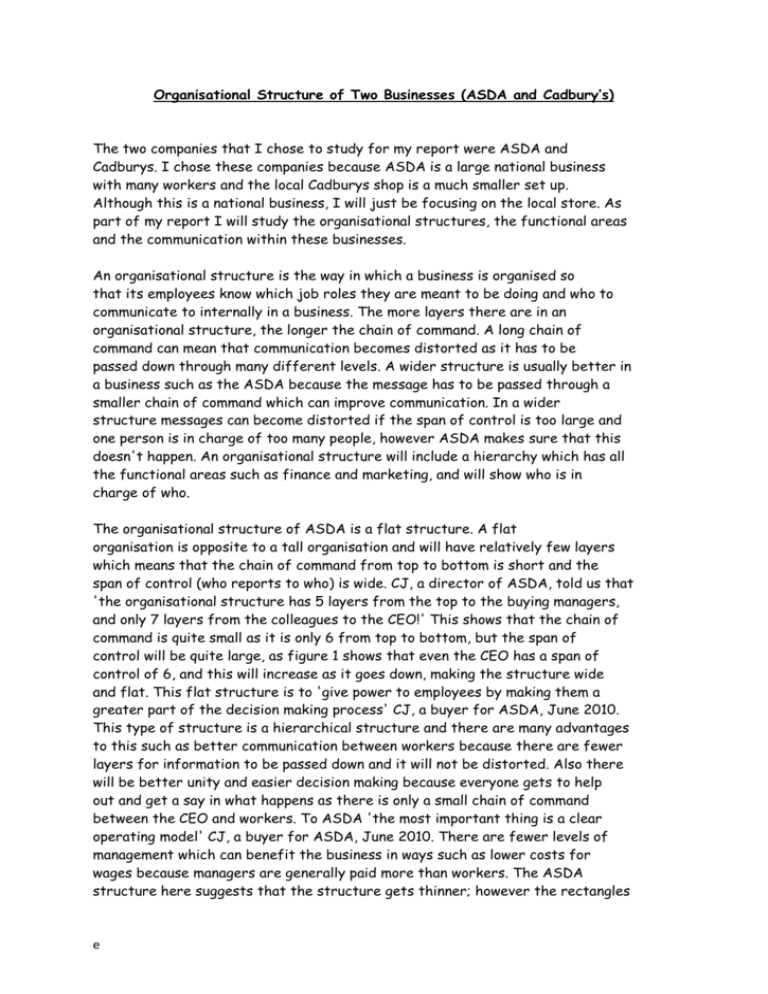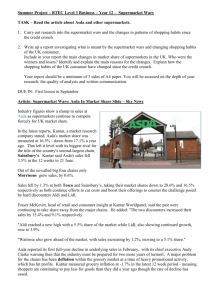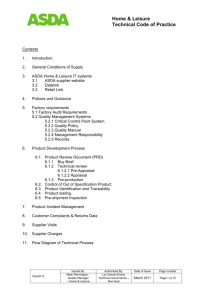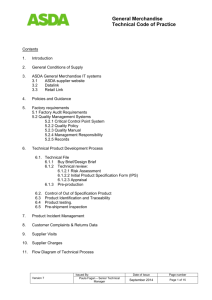File - hagrbusiness
advertisement

Organisational Structure of Two Businesses (ASDA and Cadbury’s) The two companies that I chose to study for my report were ASDA and Cadburys. I chose these companies because ASDA is a large national business with many workers and the local Cadburys shop is a much smaller set up. Although this is a national business, I will just be focusing on the local store. As part of my report I will study the organisational structures, the functional areas and the communication within these businesses. An organisational structure is the way in which a business is organised so that its employees know which job roles they are meant to be doing and who to communicate to internally in a business. The more layers there are in an organisational structure, the longer the chain of command. A long chain of command can mean that communication becomes distorted as it has to be passed down through many different levels. A wider structure is usually better in a business such as the ASDA because the message has to be passed through a smaller chain of command which can improve communication. In a wider structure messages can become distorted if the span of control is too large and one person is in charge of too many people, however ASDA makes sure that this doesn't happen. An organisational structure will include a hierarchy which has all the functional areas such as finance and marketing, and will show who is in charge of who. The organisational structure of ASDA is a flat structure. A flat organisation is opposite to a tall organisation and will have relatively few layers which means that the chain of command from top to bottom is short and the span of control (who reports to who) is wide. CJ, a director of ASDA, told us that 'the organisational structure has 5 layers from the top to the buying managers, and only 7 layers from the colleagues to the CEO!' This shows that the chain of command is quite small as it is only 6 from top to bottom, but the span of control will be quite large, as figure 1 shows that even the CEO has a span of control of 6, and this will increase as it goes down, making the structure wide and flat. This flat structure is to 'give power to employees by making them a greater part of the decision making process' CJ, a buyer for ASDA, June 2010. This type of structure is a hierarchical structure and there are many advantages to this such as better communication between workers because there are fewer layers for information to be passed down and it will not be distorted. Also there will be better unity and easier decision making because everyone gets to help out and get a say in what happens as there is only a small chain of command between the CEO and workers. To ASDA 'the most important thing is a clear operating model' CJ, a buyer for ASDA, June 2010. There are fewer levels of management which can benefit the business in ways such as lower costs for wages because managers are generally paid more than workers. The ASDA structure here suggests that the structure gets thinner; however the rectangles e are just a representation of one Director. This would show how the structure would get increasingly wider, as the span of control increases. All directors on the second layer would have a span of control but for the purpose of this report I have only shown retail and buying. My hierarchy shows the two different sides to the structure. To the left side there is the retail director and on the left there is thecommercial director. The retail manager and everyone under his span of control would be under working for stores and management of stores, and everyone under the commercial director would be dealing with buying and selling the stock that the store sells. Subsequently, I will look at my organisation structure for Cadbury's. I looked at the organisational structure for the local Cadbury's shop and I found that this was again quite a flat, wide structure. I think that this structure is also a pyramid structure with 4 levels. A pyramid structure 'represents an organisation that has progressively more people at each lower level', (ActiveTeach page 29). This means that the chain of command is only 3 so again the communication is a lot easier and messages don't get distorted easily. The top layer in the shop would be the shop manager who will be in charge and he would have a span of control of 1 assistant manager. This is because it is important that managers aren't responsible for more people than the can sensibly control', (ActiveTeach, page 29). This assistant manager is in charge of 2 supervisors and the supervisors are be in charge of 6 colleagues. This is very small compared to ASDA because it is only a small, local shop. Nevertheless, a structure is still needed because the business needs to be organised internally so that it is clear who in charge and who is in control of whom so that they can ask them to do specific jobs. The structures are similar because they both have a short chain of command and a wider span of control as the hierarchy descends. Also, both have colleagues, supervisors and managers. However, they are still both very different because one if from a small business and the other is from a large business and because of this, ASDA has more levels and has more important people such as a CEO and directors. In such a small shop the manager has overall power, but as this is not a one off shop the company structure would be very different. e Asda Organisational Structure Cadbury’s Organisational Structure e











